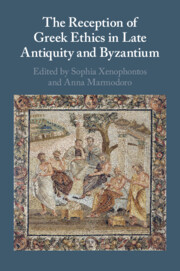Book contents
- The Reception of Greek Ethics in Late Antiquity and Byzantium
- The Reception of Greek Ethics in Late Antiquity and Byzantium
- Copyright page
- Contents
- Tables
- Contributors
- Acknowledgements
- Abbreviations
- Introduction
- Part I Ethics across the Late-antique and Byzantine Period
- Chapter 1 Sexual Difference and the Difference It Makes
- Chapter 2 Ethics and the Hierarchy of Virtues from Plotinus to Iamblichus
- Chapter 3 Neoplatonic Contemplative Ethics
- Chapter 4 Ethics, Virtue and Theurgy
- Chapter 5 Imitation and Self-Examination
- Chapter 6 The Reception of Greek Ethics in Christian Monastic Writings
- Chapter 7 Understanding Self-Determination and Moral Selfhood in the Sources of Late-antique and Byzantine Christian Thought
- Chapter 8 ‘Singing with David and Contemplating Agesilaus’
- Part II Prominent Ethical Views of the Time
- Bibliography
- Index Locorum
- Index of Names and Subjects
Chapter 4 - Ethics, Virtue and Theurgy
On Being a Good Person in Late-Neoplatonic Philosophy
from Part I - Ethics across the Late-antique and Byzantine Period
Published online by Cambridge University Press: 15 June 2021
- The Reception of Greek Ethics in Late Antiquity and Byzantium
- The Reception of Greek Ethics in Late Antiquity and Byzantium
- Copyright page
- Contents
- Tables
- Contributors
- Acknowledgements
- Abbreviations
- Introduction
- Part I Ethics across the Late-antique and Byzantine Period
- Chapter 1 Sexual Difference and the Difference It Makes
- Chapter 2 Ethics and the Hierarchy of Virtues from Plotinus to Iamblichus
- Chapter 3 Neoplatonic Contemplative Ethics
- Chapter 4 Ethics, Virtue and Theurgy
- Chapter 5 Imitation and Self-Examination
- Chapter 6 The Reception of Greek Ethics in Christian Monastic Writings
- Chapter 7 Understanding Self-Determination and Moral Selfhood in the Sources of Late-antique and Byzantine Christian Thought
- Chapter 8 ‘Singing with David and Contemplating Agesilaus’
- Part II Prominent Ethical Views of the Time
- Bibliography
- Index Locorum
- Index of Names and Subjects
Summary
In this essay I argue that there is an Iamblichean and Neoplatonic theory of ethics. By examining the seven grades of virtue recognised by Iamblichus, I show that there is associated with each grade a specific kind of cognition or knowledge. The hierarchy of kinds of knowledge is parallel not only to the grades of virtue but also to the various stages of the soul’s theurgical ascent. The higher that we ascend in the ritual, the better and more secure the knowledge we possess. Examining and interpreting a series of passages in book V of the De mysteriis, I argue that Iamblichus associates various classes of humanity with the grades of virtue and the kinds of knowledge that they possess. Putting these various criteria together, I show that Iamblichus believed that all humanity at all levels has a kind of virtue and that the philosopher-theurgists themselves have a duty to descend with their higher knowledge and work for the benefit of all humanity.
- Type
- Chapter
- Information
- Publisher: Cambridge University PressPrint publication year: 2021
- 1
- Cited by



